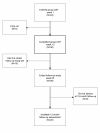Psychosocial functioning in patients with Treatment-Resistant Depression after group cognitive behavioral therapy
- PMID: 20230649
- PMCID: PMC2856539
- DOI: 10.1186/1471-244X-10-22
Psychosocial functioning in patients with Treatment-Resistant Depression after group cognitive behavioral therapy
Abstract
Background: Although patients with Treatment Resistant Depression (TRD) often have impaired social functioning, few studies have investigated the effectiveness of psychosocial treatment for these patients. We examined whether adding group cognitive behavioral therapy (group-CBT) to medication would improve both the depressive symptoms and the social functioning of patient with mild TRD, and whether any improvements would be maintained over one year.
Methods: Forty-three patients with TRD were treated with 12 weekly sessions of group-CBT. Patients were assessed with the Global Assessment of Functioning scale (GAF), the 36-item Short-Form Health Survey (SF-36), the Hamilton Rating Scale for Depression (HRSD), the Dysfunctional Attitudes Scale (DAS), and the Automatic Thought Questionnaire-Revised (ATQ-R) at baseline, at the termination of treatment, and at the 12-month follow-up.
Results: Thirty-eight patients completed treatment; five dropped out. For the patients who completed treatment, post-treatment scores on the GAF and SF-36 were significantly higher than baseline scores. Scores on the HRSD, DAS, and ATQ-R were significantly lower after the treatment. Thus patients improved on all measurements of psychosocial functioning and mood symptoms. Twenty patients participated in the 12-month follow-up. Their improvements for psychosocial functioning, depressive symptoms, and dysfunctional cognitions were sustained at 12 months following the completion of group-CBT.
Conclusions: These findings suggest a positive effect that the addition of cognitive behavioural group therapy to medication on depressive symptoms and social functioning of mildly depressed patients, showing treatment resistance.
Similar articles
-
Clinical effectiveness of individual cognitive behavioral therapy for depressed older people in primary care: a randomized controlled trial.Arch Gen Psychiatry. 2009 Dec;66(12):1332-40. doi: 10.1001/archgenpsychiatry.2009.165. Arch Gen Psychiatry. 2009. PMID: 19996038 Clinical Trial.
-
Adaptation of dialectical behavior therapy skills training group for treatment-resistant depression.J Nerv Ment Dis. 2008 Feb;196(2):136-43. doi: 10.1097/NMD.0b013e318162aa3f. J Nerv Ment Dis. 2008. PMID: 18277222 Clinical Trial.
-
Clinical study results from a randomized controlled trial of cognitive behavioural guided self-help in patients with partially remitted depressive disorder.Psychol Psychother. 2014 Jun;87(2):178-90. doi: 10.1111/papt.12008. Epub 2013 May 17. Psychol Psychother. 2014. PMID: 23681925 Clinical Trial.
-
Rapid effects of deep brain stimulation for treatment-resistant major depression.Biol Psychiatry. 2013 Jun 15;73(12):1204-12. doi: 10.1016/j.biopsych.2013.01.034. Epub 2013 Apr 3. Biol Psychiatry. 2013. PMID: 23562618 Review.
-
Psychological management of unipolar depression.Acta Psychiatr Scand Suppl. 2013;(443):24-37. doi: 10.1111/acps.12123. Acta Psychiatr Scand Suppl. 2013. PMID: 23586874 Review.
Cited by
-
The effect of forest-based health and wellness on the stress-relieve of middle-aged people.Front Public Health. 2024 May 7;12:1366339. doi: 10.3389/fpubh.2024.1366339. eCollection 2024. Front Public Health. 2024. PMID: 38774044 Free PMC article.
-
Cognitive behavioral therapy for depression changes medial prefrontal and ventral anterior cingulate cortex activity associated with self-referential processing.Soc Cogn Affect Neurosci. 2014 Apr;9(4):487-93. doi: 10.1093/scan/nst009. Epub 2013 Jan 17. Soc Cogn Affect Neurosci. 2014. PMID: 23327934 Free PMC article.
-
Depression treatment and health-related quality of life among adults with diabetes and depression.Qual Life Res. 2016 Jun;25(6):1517-25. doi: 10.1007/s11136-015-1189-y. Epub 2015 Nov 21. Qual Life Res. 2016. PMID: 26590839 Free PMC article.
-
Approaches to understanding and addressing treatment-resistant depression: a scoping review.Depress Res Treat. 2012;2012:469680. doi: 10.1155/2012/469680. Epub 2012 Apr 18. Depress Res Treat. 2012. PMID: 22570778 Free PMC article.
-
IMPROVEMENTS IN PSYCHOSOCIAL FUNCTIONING AND HEALTH-RELATED QUALITY OF LIFE FOLLOWING EXERCISE AUGMENTATION IN PATIENTS WITH TREATMENT RESPONSE BUT NONREMITTED MAJOR DEPRESSIVE DISORDER: RESULTS FROM THE TREAD STUDY.Depress Anxiety. 2016 Sep;33(9):870-81. doi: 10.1002/da.22521. Epub 2016 May 10. Depress Anxiety. 2016. PMID: 27164293 Free PMC article. Clinical Trial.
References
-
- Souery D, Papakostas GI, Trivedi MH. Treatment-resistant depression. J Clin Psychiatry. 2006;67(Suppl 6):16–22. - PubMed
-
- Souery D, Oswald P, Massat I, Bailer U, Bollen J, Demyttenaere K, Kasper S, Lecrubier Y, Montgomery S, Serretti A. Clinical factors associated with treatment resistance in major depressive disorder: results from a European multicenter study. J Clin Psychiatry. 2007;68(7):1062–1070. doi: 10.4088/JCP.v68n0713. - DOI - PubMed
-
- Thase ME, Rush AJ. When at first you don't succeed: sequential strategies for antidepressant nonresponders. J Clin Psychiatry. 1997;58(Suppl 13):23–29. - PubMed
Publication types
MeSH terms
Substances
LinkOut - more resources
Full Text Sources
Medical


